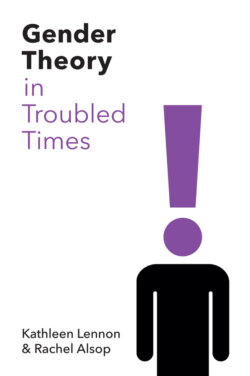Читать книгу Gender Theory in Troubled Times - Rachel Alsop - Страница 9
Theoretical shifts
ОглавлениеWhen we wrote Theorizing Gender at the end of the twentieth century, gender theory had been transformed by the work of Judith Butler (1990a, 1990b, 1993). The alignment of gender theory with queer theory, the performative account of gender, and the destabilization of the sex/gender distinction provided a new orientation to the question of sexed difference, as well as new directions for intervention in oppressive practices. We were dazzled, and remain so. But in the intervening years it has been possible to place Butler’s work within a more multifaceted domain.
We have been able to see the way Butler’s work built on the ground-breaking feminist phenomenology of Simone de Beauvoir ([1949] 2010). We have included a careful interrogation of her work here, reflecting an increasing body of feminist scholarship in recent years (Card 2003; Deutscher 2008; Kruks 2012; Moi 2008; Sandford 2006). Such re-engagement with Beauvoir has been accompanied by a more general recognition of the importance of phenomenological resources for gender theory, with particular attention to the work of Merleau-Ponty (Young 2005; Heinämaa 2003; Alcoff 2006; Ahmed 2006; Salamon 2010; Gonzalez-Arnal et al. 2012; Dolezal 2015; Weiss 1999, 2015; Lennon 2018).
Beauvoir also anticipated other aspects of feminist theory which have come to the fore since 2000. One is the emergence of what has been termed the new materialism, insisting that, although we have no unmediated access to the material, including the biological world, our accounts are answerable to it, and it plays an active role in the development of those accounts (Alaimo and Hekman 2008; Fausto-Sterling 2000). A key theorist here is Donna Haraway (1991, 1997, 2008, 2016), whose pioneering work we had acknowledged in our original book, and whose contribution has now been celebrated within the new materialist framework.
There has also been a revival of interest in historical materialism (Coole and Frost 2010a; Jackson 2001; Walby 2011), another aspect of Beauvoir’s account – an insistence on the way the economic and social world is structured by both capitalism and patriarchy. Such objective structures are both constituted by and constituting of gender difference. They work both locally and globally (Mohanty 2003; Parashar 2011).
The work of post-colonial writers has highlighted the way capitalist and patriarchal structures both require and constitute the workings of colonialism (McClintock 1995; Spivak 1988; Mohanty 2003). The emergence of decolonial feminism, which has become increasingly prominent in the last decade, provides ‘a way of understanding the oppression of women who have been subalternized through the combined processes of racialization, colonization, capitalist exploration, and heterosexualism’ (Lugones 2010; see also Ortega and Alcoff 2009; Alcoff and Mendieta 2003; Ortega 2016).
The work of decolonial feminists sits alongside that of writers giving an intersectional analysis of all aspects of social identity. Black feminist theory from the 1980s on (Crenshaw 1989, 1991; Collins 1990) insisted that we could not provide general accounts of gendered positionality and subjectivity, for they were mutually constituted with differences in race and class. Decolonial writers insist that such categories are constituted very differently for colonizers and the colonized (Lugones 2010). Such work became crystallized when Crenshaw (1991) coined the term ‘intersectionality’. What this work has made clear is that any account of gender must pay attention to its inter-articulation with race, class, ability, age, sexuality, religion, nationality and colonial legacy, as well as to the power differentials which are thereby marked.
Another key development has been the increasing availability of both theory and memoir from writers who are sometimes grouped together under the umbrella term ‘trans’ (see chapter 7) (Bettcher and Garry 2009; McBee 2018; Namaste 2000; Stryker and Aizura 2013). This work has made clear how the diverse possibilities for living, which such accounts make evident, are central to gender theory.
The developments in Butler’s later work (2004a, 2004b, 2010) have also been indispensable, most particularly her attention to our embodied vulnerability to others and the material world and the necessity of recognition by communities of others for ensuring a liveable life.
All of this work has informed the account which we offer here.
